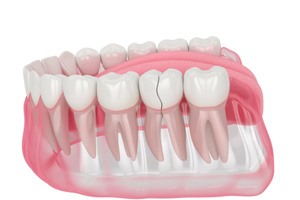
Root Canal Therapy – Northborough, MA
Relieve Your Pain & Save Your Tooth

When the interior portion of a tooth, called the pulp, suffers infection or damage, root canal therapy may become necessary. Although this treatment has a reputation for being painful and extremely unpleasant, it is actually designed to relieve your pain, save your tooth, and protect your long-term oral health. Most patients are pleasantly surprised by how comfortable and easy the procedure is. Read on below to learn more about this restorative emergency service .
Why Choose Northborough Dental Associates for Root Canal Therapy?
Committed to Prioritizing Patient Comfort
Experienced Dentists and Staff Members
Regain Pain-Free Dental Function
Do I Need Root Canal Therapy?

The pulp is the innermost layer of a tooth. When it becomes infected or suffers damage, root canal therapy is usually the preferred treatment. Here are some indications that you might need this procedure:
- You have a severe, throbbing toothache.
- A tooth is significantly darker than the ones around it.
- There is visible damage to a tooth, such as a chip or crack.
- A tooth is highly sensitive to hot, cold, and pressure.
- You notice a pimple-like bump on your gums.
In some cases, a root canal is necessary even though a patient is not experiencing any serious symptoms. It is wise to listen to your dentist’s treatment recommendations.
The Root Canal Process

After we use local anesthesia to make sure the patient is comfortable, we carefully access the interior portion of the tooth. Then, we use special tools to remove any damaged or infected tissue. We also remove the nerve that was sending pain signals to the pain. To help the treated tooth keep its structure, we fill it in with a material called gutta-percha. Most teeth that have undergone a root canal require a crown in order to remain strong and functional. Depending on the extent of the treatment needed, the root canal procedure may take place across one or more appointments.
The Benefits of Getting a Root Canal

Some noteworthy benefits of root canal therapy include:
- It can prevent extractions. You can maintain a complete and confident smile while avoiding the costs associated with tooth replacement.
- It is more comfortable than most people think. Patients commonly say that the procedure feels like getting a small filling.
- Its results can last a long time. A successful root canal can provide a lifetime of restored function to a damaged tooth.
- It is discreet. The crown that covers your treated tooth can be made out of materials that blend in beautifully with your natural smile.
- The results are easy to care for. Good oral hygiene and regular dental visits are both important.
Understanding the Cost of Root Canals

The cost of root canals varies from case to case. During your consultation, we will provide you with an estimate that is tailored to your unique situation. We can also help you explore options that may make your treatment easier to afford, such as insurance and financing. We want the process of paying for your care to be as stress-free as possible.
Factors That Can Affect Root Canal Cost

Some of the factors that can have a bearing on root canal cost include:
- The specific tooth that needs to be treated. Generally speaking, root canal therapy costs less for front teeth than it does for molars due to the different levels of complexity involved in treating them.
- The overall difficulty of the case. We can perform most root canals right here in our Northborough dental office. Sometimes, though, we refer patients to a specialist with a pricing structure that is very different from our own.
- Additional care. If you require a crown after your root canal or other additional services, they will increase the total cost of your care.
Is It Cheaper to Pull My Tooth?

Upfront, it costs less to get a tooth pulled than it does to undergo root canal therapy. However, we encourage patients to think about the long-term financial implications of any treatment they choose. For example, a tooth extraction may be low-priced initially. Later on, though, a missing tooth can lead to costly complications. To protect your oral health, you should get the tooth replaced, which can also be somewhat pricey.
It is generally more affordable in the long-run to invest in high-quality root canal therapy right from the beginning. Because this procedure aims to preserve a damaged tooth, it can prevent expensive problems in the future.
Does Dental Insurance Cover Root Canals?
It is common for dental insurance to cover root canal therapy. Some insurers classify this treatment as a minor service, meaning that 80% of its cost might be covered. Others deem it to be a major service, so around 50% of its price might be covered. Of course, you will have to check your unique policy to see how it applies. Our team will be happy to help you understand your insurance benefits and use them in the most advantageous way possible.
Other Options for Making Root Canal Therapy Affordable

We want you to be able to afford your care. To that end, we offer a few useful provisions:
- Financing. If you would like to pay for your treatment over time, ask us how you can apply for low-interest financing through CareCredit. Most patients are approved very quickly for their payment plan.
- Essential Dental Plan. If you do not have insurance, ask us how you can sign up for the Essential Dental Plan. In exchange for a reasonable fee, it provides reduced prices on virtually all the services available in our practice.
Would you like to learn more about root canal therapy and its financial side? Get in touch with our team today. We look forward to hearing from you!
Root Canal Therapy FAQs

The Northborough Dental Associates Team is ready to help you find relief from your toothache via root canal therapy. Before you commit to anything, however, you may want to learn more about the path in front of you. To assist you, we have compiled the following list of root canal therapy FAQs, along with succinct answers. If your specific questions are not addressed here, please reach out to us directly. We look forward to speaking with you.
How Long Does It Take to Recover from a Root Canal?
Most people are able to return to work or school the day after their appointment. Keep in mind, though, that patients heal at different rates; do not be disappointed if you need to take a little extra time to rest. Also, you may need to request additional time off if your job requires a lot of physical activity.
It is common to be sore for several days after a root canal. Gentle oral hygiene, eating a soft diet, and taking painkillers as recommended can reduce your discomfort. If your pain worsens or you notice signs of an infection, contact our practice ASAP.
What Should I Do Before a Root Canal?
Here are a few practical measures that you should take prior to your appointment:
- Eat a nutritious meal. You might not feel like eating after your procedure, so filling up beforehand is usually a good idea.
- Take a pain reliever. Taking ibuprofen or a similar medicine before your procedure can reduce the soreness that you will feel afterward.
- Stock up on soft foods. A soft diet can minimize posttreatment discomfort.
- Get a good night of rest. Being well-rested could reduce the anxiety associated with your treatment and support your body’s recovery process.
How Long Do Root Canals Last?
A successful root canal has the potential to provide a lifetime of restored function to a treated tooth. In fact, many patients are still enjoying the benefits of their root canal decades after the original procedure.
Of course, how long the results of your treatment last depends partially on you. You should be diligent about maintaining thorough oral hygiene and protecting any restorations that get placed on your treated tooth. If anything ever feels amiss with your tooth, you should seek professional care as soon as possible.
What Happens If You Wait Too Long for a Root Canal?
Keep in mind that teeth cannot heal themselves, so your tooth will not miraculously recover without professional care. In fact, any decay or infections are likely to get worse. The problem could even reach the point where the tooth can no longer be preserved. You might need to get it extracted.
There is also the possibility that delaying treatment for too long could allow an infection to spread throughout the rest of your body. Rarely, people have died from complications that resulted from an untreated dental problem.